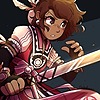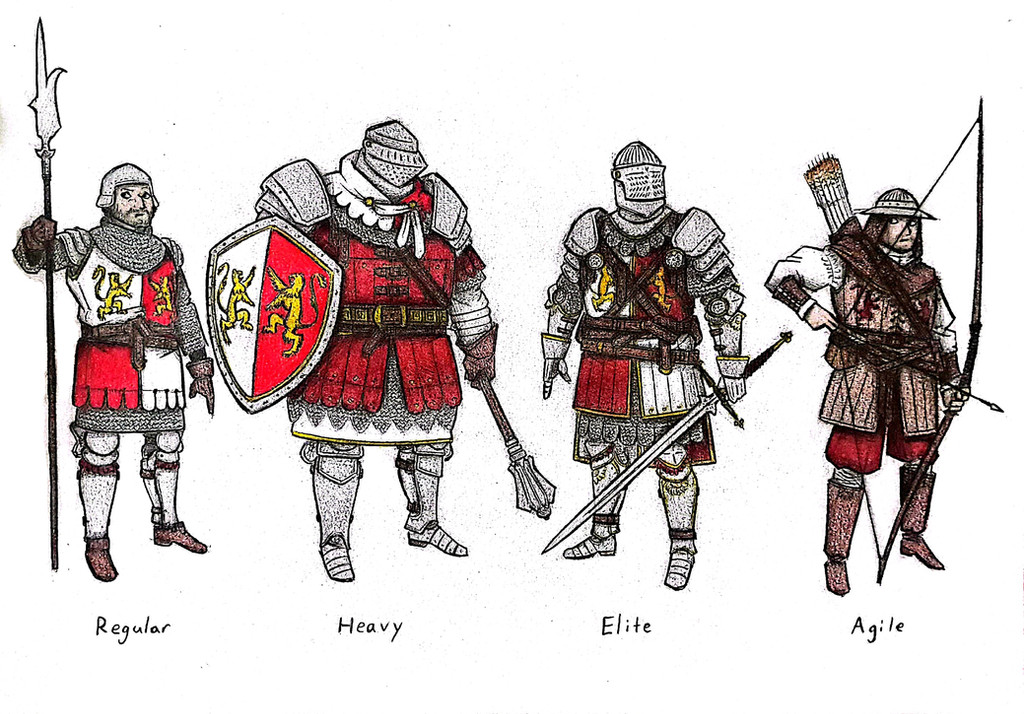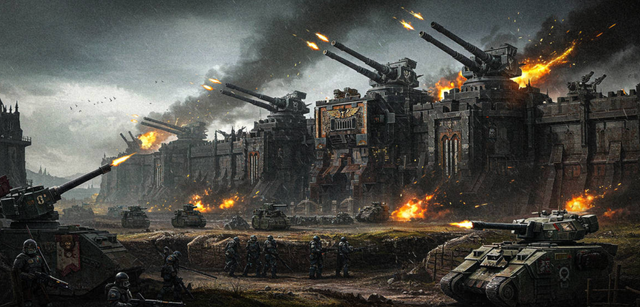HOME | DD
 Avapithecus — Plantagenet Knights
Avapithecus — Plantagenet Knights

#character #design #english #history #knights #medieval #plantagenet #referencesheet #hundredyearswar
Published: 2024-03-02 19:41:27 +0000 UTC; Views: 8955; Favourites: 115; Downloads: 0
Redirect to original
Description
Ignore me- I'm just gonna delete then re-upload these three sheets because the description glitch is driving me absolutely bonkers and since DA tech support ain't gonna do anything, this seems to be the best fix.Though most famous as the ruling dynasty of late medieval England, the earliest kings of the House of Plantagenet were as French as a croissant stuffed with frog legs and topped with escargot. There hadn’t been an English arse on the English throne since William the Conqueror steamrolled his way into London in 1066. Through William's granddaughter Matilda, French nobles from the County of Anjou started getting dragged into English politics… well okay, let's be real, French politics that just happened to take place in England. Specifically, she married a count named Geoffrey, nicknamed “Plantagenet” after the specific species of flower he used as a motif on his armor. Matilda had actually been in line to succeed her father as ruler of England after her brother William Adelin had gotten so drunk that he crashed and sank his own ship in 1120. When the king died in 1135, however, his nephew Stephen pounced on the crown, so Matilda spent the next two decades trying to get it back. This period of English history is delightfully referred to as “the Anarchy” because the barons got a hell of a lot more out of just managing their own affairs than answering to either claimant.
While Matilda never reclaimed her birthright herself, she did eventually reach a compromise with Stephen wherein her son Henry would be designated as heir. So it was that when Stephen kicked it in 1154, Henry II became the first Plantagenet king of England. He spent most of his time across the pond in Anjou, however (cause England is a silly place that smells of elderberries) hence why Henry’s territory is often referred to as the “Angevin Empire”. It was a pretty nifty patch of territory, especially when Henry added Brittany to his domain in 1166 and started chiseling his way into Ireland in 1169. Sure, having pretty much half of France under his thumb really pissed off King Louis (whom he was still technically a vassal of), but that guy was a nerd and Henry shagged up with his ex-wife. Loser. Another nerd harshing Henry’s vibes was a monk named Thomas Becket, who was a big advocate for the church doing basically whatever the fuck it wanted because they were only answerable to God and not Earthly kings and bla bla bla. Henry was so fed up with the shit spewing from this pulpit that he grumbled out loud “will no one rid me of this troublesome priest?”. Several of his knights took this as an assassination contract, and promptly excommunicated Becket from life in 1170. This seriously pissed off the clergy, but what were they gonna do about it? Tattle to Jesus like a bunch of little bitches?
No, Henry was too busy living it up on Earth to give two shits about Hell. By this point, the only problem he had left was making sure his sons didn't kill each other over his throne. His eldest son, dubbed Henry the Young King, was crowned heir apparent over Anjou, England, and Normandy, while his younger sons Richard and Geoffrey got Aquitaine and Brittany respectively. On paper, this was supposed to make the sons feel like everyone got an equal cut, except no, that's not how teenagers work. In 1173, the brothers all banded together with their mother and King Louis to usurp the throne and I guess just sort it out with the bro-code from there. Every party in this rebellion was spanked and sent to bed without supper, though Richard licked enough boot to convince his father he could be put to better use suppressing rebels. To his credit, he earned his keep, as the man who would eventually be dubbed Richard the Lionheart swiftly gained a reputation as one of the greatest and most ruthless military commanders of his day. It would serve him well, as the Young King died in 1183, and Geoffrey followed suit in 1186, leaving Richard as heir apparent. He had a little brother, John, but John was just discovering hair in places he hadn't before. Sharing his kingdom was pretty much just a suggestion from their father, one that was thrown into the bin when Richard surrounded him with the wall of swords he'd accumulated under his command. Richard was named the sole heir in July 1189, and his father died, extremely conveniently, just two days later.
Richard was now king, and that's all well and good, but more than that, he was a soldier, and a soldier needed a war. Luckily for him, he had inherited the spot that had been reserved for his father in the army of the Third Crusade. Finally, something to do! He was getting bored! He set out for the Holy Land in the summer of 1190, taking a couple detours to completely overhaul the political landscape of Sicily and Cyprus, before finally arriving on Saladin's doorstep in June 1191. He lifted the Siege of Acre, slaughtered some POWs, tried and failed to get his sister hitched to Saladin's brother, probably had the king of Jerusalem assassinated, good times good times. By August 1192, though, he and Saladin had gotten tired of playing, and besides, King Philip II of France was back home picking away at Angevin territory behind Richard's back. Richard signed a treaty with Saladin so that he could go deal with that whole situation, but then on the way home he got captured by the Duke of Austria and held for ransom in the Holy Roman Empire until 1194. Everything was going just absolutely ass-end up, but thankfully for Richard, he had such a badass reputation that all of his subjects couldn't dream of it being his fault! No no, it must be his incompetent little shit weasel of a brother John! Oh if only we had some sort of green spandexed super-archer to defend the poor folk of England from this usurper king until Richard got back…
Oh well, Richard did eventually get back, staying in England only long enough to assure everyone that yes, he was still king of England, and then fucked off to hash it out with Philip in France until he died in 1199. Since Richard had no sons (well okay he did, probably even a lot more than we have recorded in history, but a whopping zero of them were legitimate), John was named the sole king of England. Robin Hood legend remembers John as one of the worst kings in English history, but in reality, John just inherited a completely unsalvageable situation and got the blame because he was the man in the shiny hat. Philip completely undermined John's authority on the Continent, which put pressure on John to raise taxes for the war effort, which in turn pissed off all his barons. In May 1215, these disenfranchised barons revolted under the leadership of Robert Fitzwalter. King John had no real choice but to capitulate to their reformatory demands, resulting in the signing of the Magna Carta on June 15, 1215. This document is arguably one of the most important in English legal history, considered one of the first steps to restricting the powers of the monarchy. Of course, John wasn't down with that, so pretty much the second his pen left the paper, he went back on his word and raised an armed militia against the barons.
It didn't last long, as John died in October 1216 and left behind a nine-year old Henry III as his heir. This was awesome for the barons because nine-year olds are not especially famous for their independence, so Henry became their puppet. The only problem with this is that they had already selected a puppet: Louis, son of King Philip of France, and he was certainly old enough to do something about getting abandoned. He raided England, only to be halted by the famed William Marshal at the Battle of Lincoln in May 1217. By September, Louis was forced to give up his claim, but he'd be back, ohhh he'd be back. In 1223, King Philip died, and the French crown (and all the sharp objects that come with it) were passed to Louis, who in 1225 used all those sharp objects to take Henry’s territories in Poitou and Gascony. Henry desperately needed his barons to lend him their military and financial support, and they would only do so with the promise that the Magna Carta be upheld. Henry consented to this, and unlike his father, did not go back on his word, meaning the Magna Carta was now officially approved by the highest office. Henry came of age to rule independently in 1227, and while there were certainly hiccups, the omnipresent threat of French invasion usually kept Henry in check… at least for a while.
The dam wore down in 1258, when Simon de Montfort forced Henry to sign the Provisions of Oxford, which effectively ceded all his royal authority to Simon's parliament of selected barons. Henry decided enough was enough and tattled to the Pope, who issued a papal bull proclaiming that democracy is dumb and stinky and that Henry had full authority to snuff out these barons. The barons, understandably, weren't content with this conclusion, resulting in the Second Barons’ War in 1264. While Henry was captured at the Battle of Lewes, he escaped to turn the tables at the Battle of Evesham in August 1265, effectively ending the war, though resistance held out until a treaty was signed in 1267. An exhausted Henry eventually kicked it in 1272, passing the throne to his son Edward, a six-foot giant of a man whose height earned him the nickname “Longshanks”.
Edward had actually been away on crusade against the Mamluk sultan Baybars when his father died. He'd even earned a battle scar fighting off the poisoned dagger of one of the last Nizari Assassins. Having gained little in the Holy Land, however, he returned home to pursue a much more lucrative conquest. Llywelyn ap Gruffudd, Prince of Wales (a ceremonial title emphasizing his influence, not territory) had been an ally of Simon de Montfort, and continued to be a thorn in the Plantagenets’ side. Edward rolled into Gwynedd in 1277 to spank the Welsh prince, but this wasn't enough to keep them down for long. Llywelyn himself died in battle against the English in December 1282, and soon Wales became Edward's personal stomping grounds. In 1301, he'd gift these conquered lands to his son (also called Edward), bestowing upon him Llywelyn's vacant title of “Prince of Wales”, which is why to this day the male heir apparent of the British throne is given that title.
Of course nowadays the only thing people remember about Wales is that it's a perfect place to park a Type 40 TARDIS for refueling on rift energy. It's the kingdom to England's north that brought Edward Longshanks into infamy. Ever since Scotland's king Alexander III died in 1286, the place had been in utter crisis. His toddler daughter Margaret was sent over from Norway in 1290 to take the throne, the plan being that she'd eventually marry a son of Edward and their child would inherit both crowns, unifying the island. She died on the trip to Great Britain, however, splitting the secession crisis into two factions: supporters of John Balliol and supporters of Robert de Brus. To avoid civil war, the Scots called upon the English to make the decision for them. As the entire rest of human history has taught us, this is one of the biggest mistakes you can possibly make. Edward agreed to be the arbitrator on the condition that both claimants acknowledge his lordship over the Scots, ultimately picking out John Balliol as the better puppet in 1292. Balliol proved to be less of a little bitch than Edward had hoped, though, going behind England's back and securing an alliance with France. 1296, Edward invaded Scotland, and the war was on. His army mortally wounded rebel leader Andrew Moray at the Battle of Stirling Bridge in 1297, but that just left the position open for the famed William Wallace to assume command. Wallace's harassment of the English (very inaccurately retold by Mel Gibson in the movie Braveheart) continued until he was captured and executed in 1305. Edward himself died in 1307 though, passing the conflict to Edward II, who would lose spectacularly to Scottish king Robert the Bruce at Bannockburn in June 1314 and decide he had more important problems to deal with.
Specifically, he had to deal with not only getting cucked by his wife, but getting overthrown by his wife. She'd teamed up with nobleman Roger Mortimer to invade England in September 1326, forcing Edward to give up the crown by January 1327. Edward II had an “unfortunate accident” in prison not long after, while his son Edward III quickly outgrew his mother, Roger Mortimer, and you know what fuck it why not throw the kings of France on the shitlist while we're spit-balling. King Philip VI of the House of Valois had confiscated his territories in Gascony in 1337 because Edward was a naughty boy and the French king was still technically his boss. Clearly Edward needed a new boss like… himself! Yes, that would do nicely. By the blood of his French mother, he declared himself the true king of France, to which everyone was like uhhhh you wot mate? You can’t just assume the French throne bro. At which point Edward's jpeg went all blurry and his eyes glowed red like oh can’t I??? So to make a 116-year long story short, Edward skipped over to France and burnt everything to the ground until his favorite son (also… called… Edward…) captured King John II in the Battle of Poitiers in 1356, forcing him into a very loosely upheld treaty by 1360. It was decisive: being French sucked. In fact, Edward decided that he’d no longer sully his tongue with that dirty frog croaking anymore. The first parliament to be addressed in the English language was held in 1362, making it the official language of jurisdiction from there on out.
While the rivalry between France and England was destined for eternity, the prosperity of Edward was not. Not only had he outlived most of his closest advisors, but he outlived his favorite son too. Edward the Black Prince died in 1376, and Edward III perished the next year. The throne went to the younger Edward's son, Richard II, who clearly was neither his father nor his grandfather. Like every CEO, he was a stuck up asshole who bled his peasants dry because beating up France was more important to him than their wellbeing. Unfortunately for him, England had been ravaged by the Black Death for the past three decades, which wiped out nearly half of the country's entire population. Less workers meant their labor was less expendable, which gave the peasants leverage to get better living conditions from their lords. And of course once the masses start to realize they can stand up for themselves, they start to realize they have no use for kings. So the peasants revolted against the nobility in 1381, and even executed the Archbishop of Canterbury. While Richard ultimately suppressed the revolt, his handling of the situation (and every situation really) made him look extremely weak in the eyes of Parliament and his ambitious uncle, John of Gaunt, the Duke of Lancaster. John had been next in line to the throne until he died in 1399, at which point that claim went to his son Henry. Henry didn't exactly need to do much to convince Richard's nobles that life would be infinitely better if he was in charge, and within a year of John's death, Richard was overthrown and thrown in a dungeon where he'd rot away his final days. Thus was crowned King Henry IV, the first king of the House of Lancaster, which is technically just a cadet branch of the House of Plantagenet, but we'll be here for another six paragraphs if I have to talk about the War of the Roses. So for now, we'll save that game of thrones for a time when I've… actually seen… Game of Thrones…
Design notes, I already like this one way more than my Capetian knights. And no, that wasn't another joke at the expense of the French… intentionally. I think it just comes down to getting more practice in. I'm still really inexperienced with late medieval styles, and those helmets oh my gods what a pain in the ass to draw. I can do early medieval, and I can do early modern, but idk the whole knights in shining armor aesthetic just never connected with me. Like I get it, but I was just exposed to so much of it as a kid that all it really comes across as in my mind is a silly cartoon stereotype. Obviously unfair, but what are ya gonna do. Still, I do my best to avoid just recoloring previous designs. I didn't just want to make these red versions of the Capetian designs, and that drive to make something unique helped guide my pencil. It's certainly not perfect, but I think I'm improving, and it is a massive improvement over the French. Yeah yeah insert your own joke here.























